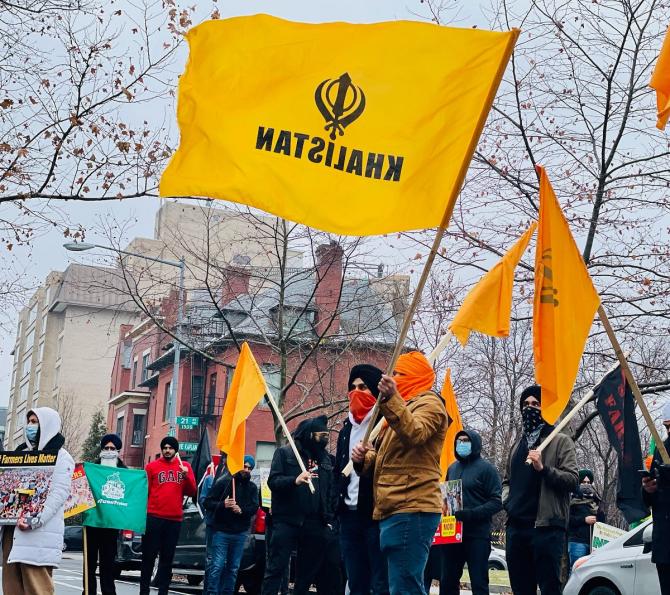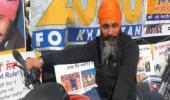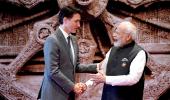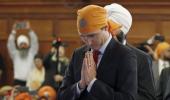Pro-Khalistan elements have been "operating freely" from Canadian soil for nearly 50 years now in the garb of notions like 'freedom of expression' and 'political advocacy' but the country maintains "complete silence" on intimidation, violence, drug trafficking by these extremists, sources said on Tuesday.

The bombing of Air India plane Kanishka was perpetuated by Khalistani extremists way back in 1985 and it was one of the biggest terror attacks in the world in the pre-9/11 era.
However, due to the apparent "lackadaisical" approach of Canadian agencies, key accused Talwinder Singh Parmar and his bunch of Khalistani extremists got away scot-free, the sources said.
Ironically, Parmar is now a hero of pro-Khalistan extremists in Canada with banned group Sikhs For Justice naming its campaign centre after him.
Over the years, Khalistani extremists were further "emboldened" and started "operating with impunity" from Canada.
In the last decade, links of Canada-based Khalistani extremists have emerged in more than half of the terror cases reported from Punjab, according to the sources.
The multiple targeted killings of Sikhs, Hindus and Christians in Punjab after 2016 were the handiwork of Khalistani separatist Hardeep Singh Nijjar, whose killing has led to a row between India and Canada.
But Canadian agencies allegedly never launched any inquiry or investigation against Nijjar and his friends Bhagat Singh Brar, Parry Dulai, Arsh Dalla, Lakbir Landa and many others, the sources said, adding that for Canada, they remain "political activists" despite the increasing body count in Punjab.
Punjab today suffers heavily because of extortion rackets run from Canada and gangsters based in the North American country bring drugs from Pakistan through drones and sell them across Punjab, they said.
A part of this money goes back to Khalistani extremists in Canada.
Even in Canada, many pro-Khalistan extremists are part of the drug trade. Inter-gang rivalries among gangsters from Punjab are common in Canada now.
The sources said a pro-India Sikh leader, Ripudaman Singh Malik, was killed in 2022 in Surrey in Canada, a murder that many say was orchestrated by Nijjar.
But Canadian agencies allegedly did not show any urgency in finding the culprits and unravelling the real conspiracy, they said.
Two local criminals who were not of Indian origin were only charged in the case.
"Soft pedalling" of Khalistanis ensured that moderate and pro-India Sikhs were thrown out of many big gurdwaras in Canada using the muscle and money power of the pro-Khalistan extremists, they added.
Emboldened by their "rising clout" in Canada, pro-Khalistan extremists have started openly intimidating the minority Hindus in Indian diaspora in Canada and defacing their temples.
The recent open threats by Khalistanis to the physical security of Indian missions and diplomats in Canada are a very serious development and challenge obligation of Canada under the Vienna Convention.
It appears that in Canada, there are different scales for measuring human rights, the sources said.
Voices from Canada are very strong on even trivial issues in Punjab while there has been a "complete silence" on intimidation, violence, drug trafficking and extortion by pro-Khalistan extremists sitting there and affecting both countries, they said.
The row between New Delhi and Ottawa erupted after Canadian Prime Minister Justin Trudeau on September 18 alleged the "potential" involvement of Indian agents in Nijjar's killing in June.
India strongly rejected the allegations as "absurd" and "motivated" and expelled a senior Canadian diplomat in a tit-for-tat move to Ottawa's expulsion of an Indian official over the case.
In a reflection of hardening of its position, India on September 20 advised all its nationals living in Canada and those contemplating travelling there to exercise "utmost caution" in view of growing anti-India activities and "politically-condoned" hate crimes as well as "criminal violence" in that country.
The next day, India announced that it was temporarily suspending issuance of visas to Canadian citizens in view of "security threats" faced by its high commission and consulates in Canada.










